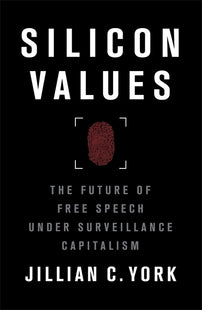Silicon Values: a Letter from the Editor
"Who manages the digital commons? As the public sphere becomes an privatised platform, who watches the watchmen?" –Leo Hollis, editor

Silicon Values: The Future of Free Speech under Surveillance Capitalism by Jillian C. York is a pick in the March Verso Book Club. See the rest of our spring book club picks here.
Was Mark Zuckerberg or Jack Dorsey right to cancel the President in the aftermath of the January 6 insurrection? While an end to Trump’s constant spew of digital slurry may be welcome, it raises a long overdue debate that has been swept under the carpet for too long: who has the power to decide what does, or does not go on the internet?
Is it the job of politicians who still maintain a grasp on what makes the public good? Or billionaire entrepreneurs deeply invested in the attention economy?
Can an algorithm parse hate speech? Tell the difference between propaganda or protest? If we are to take content moderation seriously, why is there a lack of transparency around companies’ public policy? Jillian C. York has been on the front line of the freedom of speech debate, online and IRL, for over a decade. She started working at the Electronic Frontier Foundation in 2011, having been involved in campaigns in Morocco leading up to the Arab Spring. There are probably few people in the world that know more about the dark politics of how the platforms that mediate our lives monitor, manage and censor what we read. What she urgently shows us is that offline repression replicates itself online.
From the stifling of protest during the Arab Spring, to the allowances given to Holocaust denial or hate speech, as long as it achieves clicks, there seems to be no rhyme or reason to what gets through. Furthermore, how can a social media empire see it as their right to take down a picture of a mother breast-feeding or two men kissing because of a complaint? These are all instances that have occurred – and continue to occur – with seeming impunity.
Jillian argues that these anecdotes have a more serious purpose. Who manages the digital commons? As the public sphere becomes an privatised platform, who watches the watchmen? Governments have refused to act and this vacuum has been filled by the Silicon Valley titans – predominantly white, male, educated, American - who assume that the way they see the world is how it should be. Why is it up to the tech bros to police the complicated topography of the public sphere? It is not.
When Jillian and I first started speaking about this book, it began with the notion of digital colonialism: how Silicon Valley were behaving like emergent empires, imperiously conquering all before them, privatising the ways we access information and communicate. It felt like a warning of what might pass.
Now, in the aftermath of the 2020 election, this seems one of the most urgent political questions of our times: how did we allow this to happen and what can we do about it?
Since January 6 Jillian has been in huge media demand, questioning the efficacy of powers we have given Twitter to silence a President, demanding that we rethink the digital commons, and that we find ways of empowering the user rather than the largest shareholders of platforms. Silicon Values expands and deepens this debate, and sets out a roadmap for the future.
Leo Hollis
London 2021
